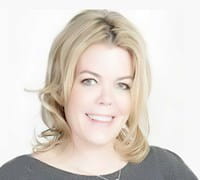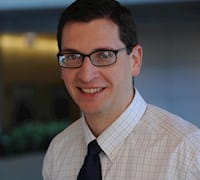
Chicago Booth MBA Masterclass Series
Go inside the Booth classroom by viewing past MBA Masterclass sessions with our world-class faculty, and sign up for future, real-time MBA Masterclass virtual events.
Chicago Booth MBA Masterclass Series

At Booth, we talk about bold thinking. Curious exploration. Questioning answers and answering questions. But prospective MBA students may wonder, what does that actually mean? What is it really like to be in the classroom, learning the fundamentals of business with some of the world’s best MBA faculty?
Thanks to Booth’s ongoing MBA Masterclass Series, prospective MBA students—and anyone curious about what learning from Booth’s faculty is all about—can get a special glimpse into the unique insights and teachings of Chicago Booth’s world-renowned professors. You can join Booth professors and fellow prospective students in an upcoming virtual MBA Masterclass session. You can also watch sessions on demand from a growing video library currently featuring 15 previous sessions covering a broad array of business areas—including accounting, behavioral economics, entrepreneurship, finance, impact investing, management, marketing, and more.
“An MBA education represents the beginning of a lifetime partnership between the students and a school,” says Kathleen Fitzgerald, ’03, adjunct associate professor of strategic management and senior director of academic support at Booth. “It's important that prospective students make the right decision for which school to attend.”

“An MBA education represents the beginning of a lifetime partnership between the students and a school. It’s important that prospective students make the right decision for which school to attend.”
With the global pandemic making in-person classroom visits impossible, Booth launched the virtual MBA Masterclass Series in fall 2020 to allow prospective students to understand much more deeply what is unique about the Booth MBA classroom experience. Fitzgerald taught the inaugural course in October 2020: Making Investment Decisions. In that class, she shared how to assess whether to undertake an investment, including one directly related to any prospective student’s professional advancement—investing in an MBA degree.
While campus visits and classroom visits provide a critical, in-person experience of the Booth MBA classroom, the MBA Masterclass Series allows prospective students anywhere in the world to access and experience the Booth way of questioning answers and answering questions, on their own schedule.
“The MBA Masterclass Series helps prospective students understand how we do things and who we are,” Fitzgerald says. “It’s a high-value way of discovering more about the school, the faculty, the material, and our approach to solving contemporary problems with solid, core tools.”
Drawing an average of 600 attendees from around the world, each MBA Masterclass session focuses on a core business area while showcasing key components of The Chicago Approach™ to business education. Booth’s data-driven and evidence-based approach helps students learn how to ask the right questions, think more strategically and analytically, and gain the confidence to take on the business challenges of today and tomorrow. The sessions also allow prospective students to experience the curious and collaborative side of Booth’s faculty, who, along with being world-class scholars, are dedicated, dynamic teachers and supportive mentors.

“We teach students the tools to design and implement solutions that are adapted to the facts and circumstances of the situation.”
In May 2021, hundreds of prospective students logged in from as far away as Hong Kong, India, Colombia, South Korea, and France to attend professor Jean-Pierre Dubé’s MBA Masterclass, Introducing The Chicago Approach to Marketing: Pricing. Dubé is the James M. Kilts Distinguished Service Professor of Marketing at Booth, as well as the faculty director of Booth’s James M. Kilts Center for Marketing. His Pricing class has become increasingly popular with MBA students over the past decade and a half.
“I’ve tried to take some concepts from my Pricing class, but use them less to teach you about pricing, and more to give you a flavor of what sort of values we espouse at Booth. And, more importantly, how we tackle business problems,” Dubé said in his introductory remarks.
The Chicago Approach to a business problem—in this case pricing—is in fact a scientific approach, which differentiates the Booth classroom experience, Dubé says. Many business schools today still focus primarily on the case-based approach to business education.
“The idea is that by studying dozens of business case studies on a topic, students will acquire simulated ‘business experience’ from which they can draw postgraduation,” Dubé says. “In other words, when confronted with a real-world problem at work, students would try to recall a case with similar challenges and the manner in which the case was solved in class.”
However, Dubé argues the case-based approach has several shortcomings. “First, there’s no such thing as a one-size-fits-all solution,” he explains. “Second, the nature of ‘evidence’ has evolved in the digital era. So a few pages of spreadsheets and figures like the ones included in the exhibits of a typical case study are woefully inadequate to capture the granular nature of data typically available to managers these days.”
While Booth faculty leverage real-world examples and cases in courses for illustrative purposes, the overall Chicago Approach is more transformative in nature, Dubé says. “We teach students the tools to design and implement solutions that are adapted to the facts and circumstances of the situation,” he says. “The Chicago Approach includes frameworks from the social sciences to learn how to devise a theoretical understanding of how actors in a given scenario likely behave, as well as data formats and corresponding tools to analyze the data. It also includes business objectives to ensure that decisions achieve the desired outcomes and optimize objectives.”

“My hope is that the Masterclass gives a sense for how Booth classes weave academic research with practical insights and applications.”
In August, Booth professor Devin G. Pope taught an MBA Masterclass entitled Behavioral Economics Applications. The session explored the question: Can psychology lead to a greater understanding of how the economy works? Pope, professor of behavioral science and a Robert King Steel Faculty Fellow, walked attendees through recent theoretical and empirical advances in this increasingly important field of economics.
“My hope is that the Masterclass gives a sense for how Booth classes weave academic research with practical insights and applications,” Pope says. “I didn’t water down my Masterclass much from what I would present in an academic seminar setting, but then we also spent a fair bit of time discussing implications of the research. I think that blend of cutting-edge research and application is somewhat unique to Booth and something that prospective students hopefully were able to get a taste for.”
Chicago Booth faculty have full independence in how they teach their courses, which is one critical distinction at Booth from many other elite business schools. For that reason, within the MBA Masterclass Series, no two sessions are alike, notes Fitzgerald, who recently taught her second Masterclass, Read and Analyze Financial Statements.
“Some classes here are more lecture based. Some are case based,” she says. “There’s more than one way to deliver the material.”
Whichever MBA Masterclass a prospective student might watch or attend, The Chicago Approach is sure to be a part of it. “No matter how each class is delivered, we still have the same approach, which is to start from the bottom up,” says Fitzgerald. “You really understand the fundamentals, so you can apply them in any situation or environment.”

Go inside the Booth classroom by viewing past MBA Masterclass sessions with our world-class faculty, and sign up for future, real-time MBA Masterclass virtual events.
Chicago Booth MBA Masterclass SeriesVisit our MBA Masterclass event page to learn more about this series and register for an upcoming Masterclass session.
Psychological Sources of Bias with Professor Jane Risen
Join Booth professor Jane L. Risen for an engaging MBA Masterclass that investigates organizational health as it relates to diversity, equity, and inclusion.
(recorded November 2, 2021)
Read and Analyze Financial Statements with Kathleen Fitzgerald
(recorded August 17, 2021)
Get an introduction to the basics of financial statement analysis, how to interpret them, and the importance of choosing the right benchmark before making conclusions.
Behavioral Economics Applications with Devin G. Pope
(recorded August 2, 2021)
Can psychology lead to a greater understanding of how the economy works? Learn more about the recent theoretical and empirical advances in this increasingly important field of economics.
Corporate Behavior and Performance: The CEO Factor with Abbie J. Smith
(recorded May 26, 2021)
Explore how a qualitative analysis of top executives can provide context for interpreting firms’ financial statements and enable better financial forecast models for risk analysis and valuation.
Macroeconomic Effects of COVID-19 with Veronica Guerrieri
(recorded May 19, 2021)
Investigate the macroeconomic effects of the current pandemic and thetypes of policies that could be the most effective, given the particular nature of the health emergency.
The Chicago Booth Approach to Marketing with Jean-Pierre Dubé
(recorded May 17, 2021)
What happens when you have an empirical focus on pricing strategies? Learn how to apply marketing models and analytics to develop pricing strategies in practice.
I Love Cash Flow: Building Intellectual Proof of Concept with Scott F. Meadow
(recorded May 3, 2021)
Examine the common issues that impair the entrepreneur/investor partnership and identify the research tools needed to analyze private enterprises to build intellectual proof of concept.
Managerial Decision Modeling and Operations Management with Baris Ata
(recorded April 28, 2021)
How do you address resource allocation problems? Develop, analyze, and solve spreadsheet models while learning about the intersection of decision-making and operations management.
Models of Entrepreneurship through Acquisition with Mark Agnew and Brian O’Connor
(recorded March 2, 2021)
What are the critical points in the life cycle of entrepreneurship through acquisition? Explore different paths young entrepreneurs take to acquire and lead a small business.
Impact Measurement for Entrepreneurs and Impact Investors with Christina Hachikian
(recorded February 23, 2021)
Explore the tools, approaches, and trends in impact measurement deployed by early stage social entrepreneurs and the impact investors who fund them.
The Psychology of Losing: A Snippet from Managerial Decision-Making with George Wu
(recorded February 17, 2021)
Get a taste of how Booth students learn about the psychology of decision-making and the concept of loss aversion—the notion that losses are more painful than gains are attractive.
Who Becomes a CEO? Who Succeeds? with Steve Kaplan
(recorded December 14, 2020)
What are the characteristics of successful CEOs and how do they differ from CFOs or COOs? Dive into the research and explore what it means for MBA students.
Behavioral Economics Applications with Devin G. Pope
(recorded November 30, 2020)
With recent theoretical and empirical advances in this increasingly important field, learn how behavioral economics helps us understand how markets work.
Marketing at Booth with Pradeep K. Chintagunta
(recorded November 18, 2020)
Get an introduction to The Chicago Approach to marketing, grounded in the core disciplines of economics, psychology, and statistics.
What Should the Objective of a Corporation Be? with Raghuram G. Rajan
(recorded November 9, 2020)
With inequality on the rise and social problems exacerbated by the global pandemic, what should the objective of a corporation be in today’s challenging environment?
Making Investment Decisions with Kathleen Fitzgerald
(recorded October 19, 2020)
Learn how to assess whether to undertake an investment, including one directly related to your professional advancement—investing in an MBA degree.

Find out how our educational approach will prepare you to think for yourself, challenge the status quo, and ground discoveries in data.
Discover Academic Life at BoothTell us about yourself, and we will show you the value of a Booth education.

A Booth Executive Education program provides frameworks for business leaders to nurture their talent and drive innovation.
Creating a Positive High-Performance Culture
In the annual Kilts Center Marketing Case Competition, Booth students gain hands-on marketing experience while companies get to meet bright future marketing leaders.
A Sweet Taste of the Marketing World
What can performance artists and musical jam sessions teach MBA students about leading in their organizations? A lot, it turns out.
Inside Chicago Booth’s Leadership Studio